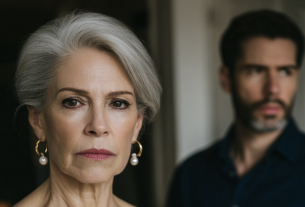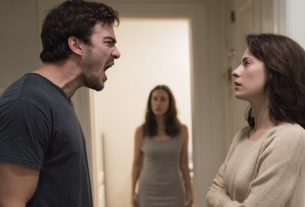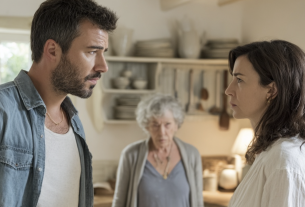— “Olya, I’ll wash them. Just later, okay? I’m completely wiped,” Maxim’s lazy, relaxed voice drifted from the living room, where he’d already settled comfortably on the couch in front of the TV. The sounds of gunfire and car chases from the movie blended dully with his words, turning them into background noise.
Olga stood on the kitchen threshold and looked at the sink. It wasn’t just a sink full of dirty dishes. It was a monument. A memorial to his unshakable principle of “later.” A tower of plates with dried buckwheat stuck to them and dark streaks from yesterday’s stew leaned dangerously, like some surreal creation of a mad architect. Beside it, three mugs rested in cloudy water, their porcelain rims stained with brown, ingrained coffee rings. Forks and spoons, glued together by something sticky and sweet, lay at the bottom like sunken treasure. Crowning the composition was a huge frying pan whose bottom was covered with a thick, congealed layer of white fat, like an icy crust on a winter puddle. The whole thing gave off a faint, sour smell of neglected housekeeping.
They were his dishes. Exclusively his. Olga washed her own right after eating, almost reflexively. She couldn’t relax knowing a dirty plate was waiting for her in the sink. It made her physically uncomfortable—like walking around in wet shoes. Maxim, however, was built entirely differently. He existed in another space-time continuum where “later” wasn’t just a word but a magical, boundless land to which any unpleasant chore could be exiled. And judging by the state of the kitchen, he was a very generous ruler, sending more and more subjects there.
At first, she tried talking. Calmly, then with a hint of irritation, then nearly slipping into ultimatums. The answer was always the same, delivered with disarming nonchalance: “I’ll wash them, why are you starting?” Sometimes, when the pile became truly indecent and they ran out of clean plates, he would, with a heavy sigh—like Atlas with the sky dumped on his shoulders—actually go and wash them. He did it noisily, splashing water everywhere and clattering the plates into the rack so everyone in the house, including the cat, would know what an inhuman feat he was performing. And two days later the story would repeat with mathematical precision.
Olga turned off the kitchen light so she wouldn’t have to look at the mess and went into the room. Maxim, sprawled on the couch, was engrossed in some action film, his feet thrown up on the armrest. His face, lit by the quick flashes of explosions on the screen, was completely serene. He wasn’t bothered by the smell from the kitchen nor by her prolonged silence. He was in his comfort zone, in his world, where problems solved themselves—or were solved by someone else.
She sat in an armchair and looked at him. Not with resentment. The resentment had run out about a week earlier, after yet another broken promise. What was inside now was something else. A cold, detached weariness, like metal fatigue. When you bend it back and forth too long, it doesn’t just break. First it loses its spring, becomes dead, limp. Something in her had died like that. The desire to ask, to explain, to hope.
She watched his profile, the way he automatically tossed chips into his mouth from the bag, and suddenly a thought was born in her head. Simple, clear, and terrifyingly logical. It wasn’t malicious or vengeful. It was just… fair. If “later” was his favorite time and place, why not help him arrange it? In a more suitable environment, where he would definitely have a couple of spare minutes.
A light, unusually bright smile appeared on her lips. Maxim, glancing at her in a lull between shootouts on the screen, raised an eyebrow in surprise.
“What’s up?”
“Oh, nothing,” she stood and walked over to him. She leaned down and gave his prickly cheek a light kiss. “Rest, dear. I’ll take care of everything myself.”
In the morning, as usual, Maxim was tearing around the apartment looking for his second sock. He was running late, and a mild irritation had already started to simmer in him like water in a kettle. Olga moved around the kitchen with an unusual, almost theatrical calm. She didn’t reproach him, didn’t hurry him. She simply poured him coffee and handed him a heavy bundle wrapped tightly in several plastic bags. It was weighty and clinked in a strange way.
“What’s this?” he asked, eyeing the bag suspiciously.
“Lunch,” she answered simply, and there wasn’t a hint of a trap in her eyes. “I cooked a lot yesterday, so I decided to pack a bit more for you. There are several containers in there.”
He snorted. The unexpected care after yesterday’s silence seemed to him like a sign of capitulation. So, it had gotten through to her. She pouted—enough of that. Pleased, though without excessive sentiment, he grabbed the bag, pecked her on the cheek, and shot out the door. The thought that his wife had finally come to her senses pleasantly warmed his self-esteem the entire ride to the office.
At exactly one o’clock the office plankton drifted into the kitchen. The air filled with the smells of reheated food: someone pulled out cutlets, someone had Greek salad, someone instant noodles. Maxim proudly set his bulky bag on the table.
“Whoa, Max, what’ve you got there? A whole piglet?” joked Vitya, the big guy from sales.
“My wife decided to fatten me up,” Maxim said smugly, untying the knot. “Says I’ve gotten scrawny at work.”
His coworkers watched with interest. He unwrapped the first layer of plastic, then the second. And then that same familiar sour smell from yesterday’s kitchen hit his nose. Maxim frowned, not understanding. He tugged at the edge of the last bag, and its contents thudded heavily onto the table.
It was the dishes. Those very ones. A plate with fossilized buckwheat. A mug with a coffee crust. The greasy frying pan. Bewildered silence fell around them. Vitya, who had already opened his mouth for another joke, froze with it half-open. Svetlana from accounting wrinkled her nose in disgust.
Then someone let out a nervous giggle. And the dam burst. First it was a soft chuckle, then it swelled into loud laughter. Vitya roared so hard the whole table shook, slapping his thighs. Svetlana let out piercing, squeal-like giggles. Even Igor the quiet programmer, who usually showed no emotion at all, was choking with laughter, covering his mouth with his hand.
“Max… what… what kind of performance art is this?” Vitya gasped between laughs. “Your wife decided you’d wash them at work?”
“An original way to drop a hint!” chimed in Svetlana. “Mine would make me sleep on the doormat for that!”
A dark, thick blush flooded Maxim’s face. He stared at the dirty plates, at the laughing faces of his colleagues, and the humiliation, sharp and hot like molten metal, scorched him from the inside. This wasn’t just a prank. This was a public humiliation. She had made him look like an idiot, a lazy good-for-nothing, a laughingstock for the whole office.
He didn’t say a word. His movements turned abrupt, mechanical. He swept the dishes back into the bag, ignoring the grease smearing his hands. The laughter behind him didn’t subside; it only grew louder at his silent reaction. He grabbed the bag like a grenade and, without looking at anyone, bolted from the kitchen and then out of the office. He didn’t hear the manager calling after him, didn’t notice the surprised looks. In his ears there was a roar—the laughter of his colleagues and the pounding of his own blood in his temples. He got in the car, tossed the bag onto the passenger seat, and floored the gas. He wasn’t going home to talk. He was going home to destroy.
“Are you completely insane?! Why did you pack dirty dishes for me instead of lunch?! You think that’s funny?! The whole office laughed at me!”
Olga was sitting in the armchair in the living room, as if she’d been waiting for him. She didn’t even flinch at his shout. She slowly set the book aside and raised an utterly calm, cold gaze to him. That look, devoid of fear and emotion, enraged him even more than the act itself. He’d expected tears, excuses, a hysterics—anything but that icy indifference.
“What is this?!” he growled, stepping toward her and shaking the bag he still clenched in his hand.
“Dishes. Dirty ones,” she answered in a flat voice devoid of intonation. As if stating an obvious fact, like the weather outside. “You kept saying you’d wash them ‘later.’ I decided you’d have more time at work, since you couldn’t be bothered to do it at home for a week.”
She paused, tilting her head slightly. Not a muscle moved in her face.
“And you don’t even need a lunch container—everything’s already prepared. Just lick the dirty plates clean.”
The last phrase cracked like a whip. Maxim’s face turned into a crimson mask. He couldn’t get enough air; he stared at her calm face, at the faint, poisonous smirk, and something ignited in his head. He didn’t see his wife before him. He saw an enemy who had coldly and deliberately humiliated him, ground his manly dignity into the dirt in front of everyone.
“You—” he found no words. Instead came a gesture. With a full swing, putting all the day’s rage and humiliation into it, he hurled the bag of dishes onto the kitchen floor.
There was a deafening crash and clatter. The thick porcelain plates and earthenware mugs shattered into hundreds of shards against the tiled floor. The frying pan rolled with a dull metallic clang all the way to the wall. That same sour smell of a week’s grime hung in the air again, now mixed with dust from the broken ceramic.
But even this didn’t rattle her. She only slowly shifted her gaze from the wreckage in the kitchen back to him. And then he exploded completely.
In two strides he crossed the kitchen. His fingers, like steel pincers, gripped the hair at the back of her head. Olga didn’t cry out—only let out a short breath at the sudden pain. With a jerk he hauled her from the armchair and dragged her to the kitchen, straight to the sink, where a couple of dirty spoons that hadn’t fit in the bag still lay forlornly. He shoved her face against the metal surface, right into the shards scattered across the countertop.
“This is your duty! Here! To wash! Got it?!” he growled right in her ear, pressing her head to the sink.
Then he yanked her head up and slammed her face hard against the edge of the basin. A dull, wet thud sounded. He let go of her. Olga slid slowly to the floor, clutching her face with her hands. From beneath her fingers a thin dark trickle of blood ran down her chin and onto the white kitchen apron.
Maxim straightened, breathing heavily, and looked with a kind of grim satisfaction at the work of his hands. At the shattered dishes, at his wife sitting on the floor, at the blood. He had taught her a lesson. Cruel, but, as it seemed to him, fair. He looked at the clock. Lunch break was already ending. He turned without a word, scooped his keys up from the floor, and left the apartment, abandoning her alone amid the devastation they had created together.
Olga sat on the cold tile for several minutes. Around her, like the petals of a deformed flower, lay the shards of their family life. The pain in her nose wasn’t sharp, but dull and throbbing, and with each heartbeat it pulsed in her temples. She raised her hand to her face and felt warm, sticky blood. But there were no tears. Inside there was a ringing emptiness, a cleanliness like after a strong storm, when the air becomes clear and cold. The humiliation at the office had been the last straw. The blow to the face was a period. Not an ellipsis, not a comma. A final, heavy period.
She stood up slowly, trying not to look in the mirror. She went to the sink, turned on the cold water, and, wetting her palm, gently pressed it to her face. Then, without changing her expression, she took a roll of paper towels and, tearing off a few sheets, pinched her nose to stop the bleeding. Her movements were slow, mechanical, like a robot executing a program.
She walked into the bedroom. Opened the closet. Her gaze slid over his shirts hanging next to her dresses. She didn’t throw or tear anything. She simply began methodically taking out her things. Dresses, blouses, jeans. She folded them carelessly but quickly, tossing them onto the bed. Then she pulled out a large duffel and a suitcase. Underwear. Cosmetics. Hairdryer. Phone charger. Everything that was hers personally.
Finished with her things, she stopped and took in the apartment. Her gaze fell on the new, huge television they’d bought three months ago with her bonus. She walked over, carefully disconnected all the cables, and laid them beside it. Then she went to the kitchen. The coffee machine, a gift from her parents for their wedding anniversary. The microwave she had bought herself, choosing the most powerful model. She looked at them, then at the shards on the floor. The decision was made.
She took out her phone. Her fingers didn’t tremble. She found the number of a cargo taxi with movers.
“Hello,” her voice was even and businesslike. “I need a truck and two movers. As soon as possible.”
Forty minutes later the doorbell rang. Two sturdy guys in work overalls looked in confusion at the woman with a paper towel pressed to her nose and at the wreckage in the kitchen.
“This,” she pointed at the TV. “And this,” she nodded toward the coffee machine and microwave. “And the suitcases from the bedroom.”
They worked silently and quickly. While they carried things out, she took one last walk through the apartment. The empty spot on the living room wall where the TV had hung gaped like a dark rectangle with the mounting brackets sticking out forlornly. The cleared kitchen countertop looked unnatural. She didn’t sweep up the shards on the floor. She didn’t wipe the small brown spot of blood on the apron. This was no longer her home. It was his problem. His “later” had finally arrived.
When the movers brought down the last of it, she closed the door behind her without locking it and went downstairs. She got into the cab beside the driver and gave her parents’ address. She didn’t look back once.
Maxim returned home around seven in the evening. The day’s rage had settled, replaced by a heavy, grim satisfaction. He pictured opening the door and seeing a subdued, tearful Olga who would rush to him with apologies. He had even prepared a speech in his head—something condescending, manly, about how you can’t do things like that, but he was ready to forgive her if she had learned her lesson.
He entered the apartment and froze on the threshold. He was met by an unfamiliar, echoing silence. And emptiness. The first thing that caught his eye was the hole on the living room wall. No TV. He moved farther, as if in a dream. In the bedroom, his shirts lay scattered on the bed where she had pushed them off hangers to get to her dresses. The closet was half empty.
He went into the kitchen. The scene of destruction remained untouched. Shards crunched underfoot. A drop of blood had dried on the white tile. And there were gaping empty spaces where the coffee machine and microwave had stood that morning. He stood in the middle of it all, and slowly, like icy water seeping through clothes, the essence of what had happened began to sink in.
She hadn’t just left. She had gutted their life, taking not only her own things but also pieces of his comfort. She hadn’t left a note. She’d left him a bill. A wrecked kitchen, empty spaces, and ringing silence echoing with his own yell and his colleagues’ laughter. He stood alone in the cooling apartment, staring at the heap of filthy, shattered plates on the floor. He had won the argument. And lost everything else…



